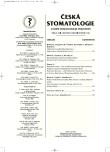Nutrition in Oncological Patients II. Practical Recommendations and Procedures in the Nutrition of Oncological Patients
Výživa u onkologicky nemocných II. Praktická doporučení a postupy ve výživě onkologicky nemocných
Onkologické onemocnění výrazně mění metabolické děje, které jsou, v porovnání s fyziologickými, méně efektivní. Jinými slovy řečeno, výsledkem změněného metabolismu je nižší zisk vysokoenergetických substrátů, například ATP. Tento energetický deficit se pokoušíme nahradit. Současně se substitucí tolik potřebných substrátů se současně setkáváme s řadou nepříznivých faktorů, které nejenom snižují a mění chuť k jídlu, ale také zvyšují averzi k některým jídlům, zhoršují žvýkání i polykání přijímané stravy. Samotná léčba onkologického onemocnění výše zmíněné negativa ještě násobí.
Klíčová slova:
malnutrice – ztráta hmotnosti – komplikace výživy
Authors:
Z. Wilhelm
Authors‘ workplace:
Fyziologický ústav LF MU, Brno
Published in:
Česká stomatologie / Praktické zubní lékařství, ročník 106, 2006, 6, s. 115-117
Category:
Overview
Oncological diseases markedly changes metabolic pathways, which are less effective in comparison with physiological ones. In other words, the outcome of the modified metabolism is a lower gain of high-energy substrates, e.g. ATP. This energy deficit is to be substituted. Concurrently with the substitution of so needed substrates we encounter a series of unfavorable factors, which not only decrease and change appetite, but they also increase aversion against some kinds of food, and deteriorate chewing and swallowing of food. The therapy of oncological diseases itself increases the above mentioned negative factors even more.
Key words:
malnutrition – weight loss – complication in nutrition
Labels
Maxillofacial surgery Orthodontics Dental medicineArticle was published in
Czech Dental Journal

2006 Issue 6
- What Effect Can Be Expected from Limosilactobacillus reuteri in Mucositis and Peri-Implantitis?
- The Importance of Limosilactobacillus reuteri in Administration to Diabetics with Gingivitis
-
All articles in this issue
- Inflammatory Myofibroblastic Tumor
- Extraarticular Posttraumatic Ankylosis (Case Report)
- Distraction Exercise – a New Method for Conservative Treatment of Anterior Dislocation of Temporomandibular Joint Disc
- Late Orthodontic Prosthetic Therapy with the Use of Delair Mask
- Oral Health in a Group of Clients from Old People’s Home
- Our Contribution to Semipermanent Splinting
- Nutrition in Oncological Patients I. Physiology and Pathophysiology of the Main Substrates in Oncological Patients
- Nutrition in Oncological Patients II. Practical Recommendations and Procedures in the Nutrition of Oncological Patients
- Czech Dental Journal
- Journal archive
- Current issue
- About the journal
Most read in this issue
- Inflammatory Myofibroblastic Tumor
- Distraction Exercise – a New Method for Conservative Treatment of Anterior Dislocation of Temporomandibular Joint Disc
- Our Contribution to Semipermanent Splinting
- Late Orthodontic Prosthetic Therapy with the Use of Delair Mask
